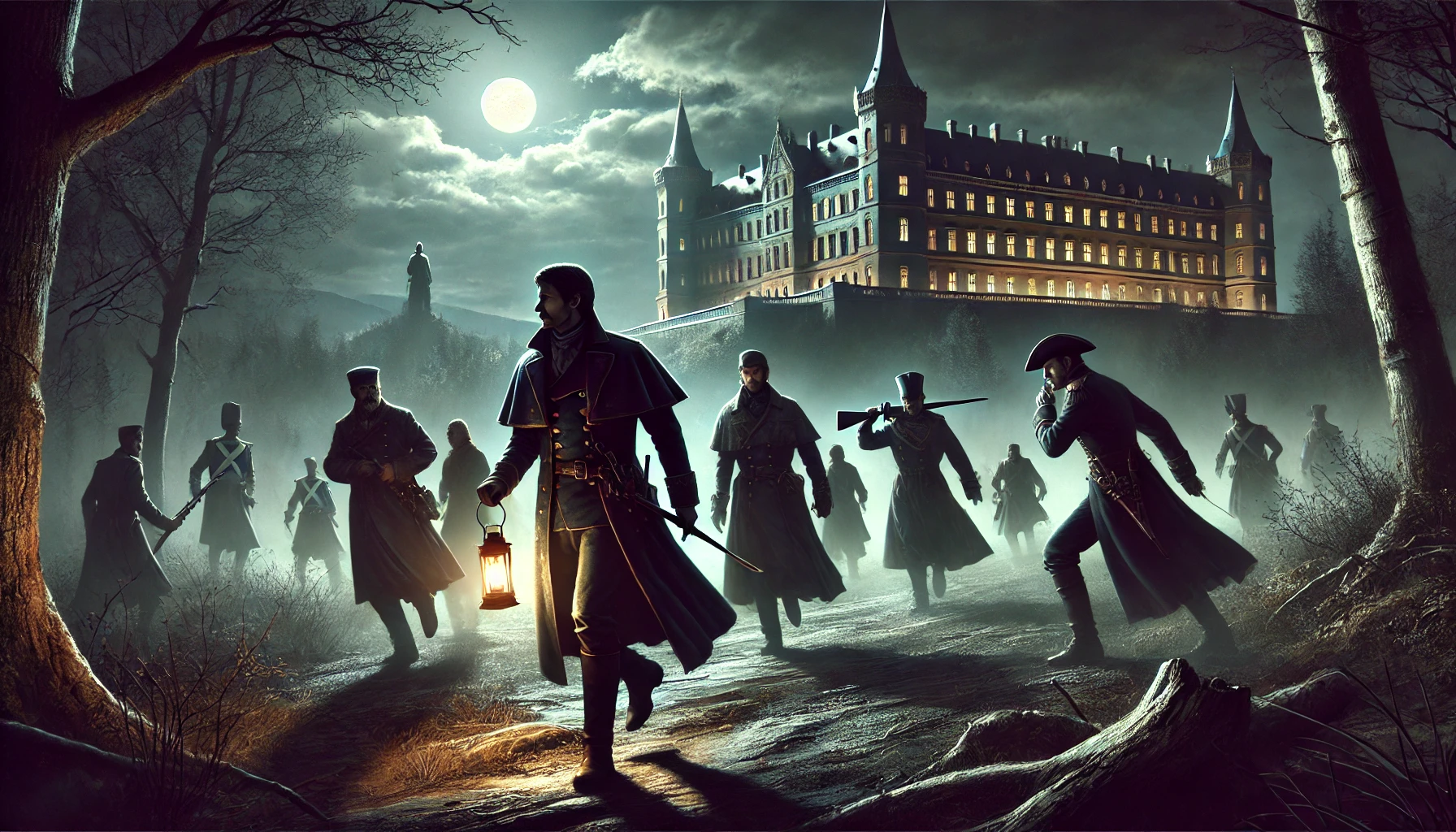Chapter 6 — The Secret of a Cellar
byChapter 6 – The Secret of a Cellar begins with Rudolf Rassendyll continuing his perilous masquerade as the King of Ruritania. Despite their initial success, the tension never truly subsides. As night falls, the urgency to flee Strelsau becomes pressing. Colonel Sapt, ever the strategist, presents a forged document meant to facilitate their escape. The trio—Rassendyll, Sapt, and Fritz von Tarlenheim—must rely on stealth, timing, and sheer nerve. Every step beyond the palace walls feels shadowed by danger, their departure cloaked in secrecy to avoid Duke Michael’s spies who lurk at every turn.
The journey from Strelsau is steeped in unease. Checkpoints loom ahead like silent sentinels, and each soldier’s glance carries the risk of discovery. Though only a handful of words are exchanged with guards, every moment is a gamble. Their forged orders are accepted without question, though Rassendyll senses their luck might run thin if they linger. The stillness of the countryside offers both cover and dread, amplifying the suspense. The group’s route winds through unlit roads and whispering trees, far from the spectacle of royal life. With each mile, their mission transforms from audacious impersonation to survival.
The forest landscape they pass through offers no comfort. While it hides them from prying eyes, it also conceals threats—ones that could spring from any shadow. Sapt’s leadership is marked by brevity and precision, qualities that make their escape possible. Fritz remains vigilant, although signs of wear show as their anxiety deepens. The darkness seems alive with echoes—hooves, whispers, the crack of branches—all teasing the possibility of pursuit. The Duke’s reach, they realize, extends far beyond the palace. Rassendyll, though a foreigner and an imposter, begins to feel the weight of leadership, driven not just by duty, but by conscience.
Reaching the hunting lodge in Zenda is meant to bring relief, yet it delivers the opposite. What they encounter is chilling: disarray, overturned furniture, and faint stains suggesting violence. The stillness is eerie, as though something sinister had passed through and left the walls holding its breath. In the cellar, the truth deepens. A grim discovery—though not explicitly spelled out—implies someone had been confined there recently, and not without struggle. It suggests Duke Michael’s hand in something dark and unforgivable. The cellar, once a place for storage, now echoes with secrets too dangerous to ignore.
This discovery forces Rassendyll and his companions to confront the gravity of their situation. Their roles have shifted from players in a courtly deception to witnesses of a crueler game. The stakes are no longer confined to a throne—they now involve the lives and fates of unseen victims. The mystery of the cellar adds a layer of dread, showing that Duke Michael may resort to imprisonment or worse. The walls of Zenda whisper of treachery deeper than Rassendyll expected when he first put on the crown. Any misstep now risks lives, not just reputations. What began as an impersonation now demands a reckoning.
Rassendyll’s transformation becomes more pronounced in this chapter. No longer driven by adventure alone, he is now bound by obligation—to justice, to those endangered by Michael, and to the kingdom he’s come to care for. His choices are no longer acts of convenience; they begin to reflect genuine responsibility. The discovery in the cellar haunts him, pressing on his conscience. Sapt, often blunt and pragmatic, shows signs of deeper concern as well. Fritz’s silence speaks volumes—he, too, understands the path forward will demand more than deception. It will require courage, and perhaps sacrifice.
From a narrative standpoint, this chapter elevates the suspense while enriching the plot’s emotional depth. Readers are not only kept in suspense but are drawn into the moral tension brewing beneath the surface. The pacing quickens with action, yet the emotional weight grounds the characters in realism. Every element—from the foggy woods to the eerie cellar—feels like a character in itself. The political intrigue is no longer a distant backdrop; it now touches every decision the characters make. Rassendyll is no longer just playing king; he is being shaped by the role.
What makes Chapter 6 especially effective is its layered storytelling. Beyond the thrilling escape, it signals the beginning of darker revelations. The hints left in the cellar suggest brutality and imprisonment, perhaps even torture—raising the possibility that the real king is being held nearby. This anchors the stakes not in hypotheticals, but in visceral, human terms. It’s not just about preserving a throne—it’s about rescuing someone from torment. The readers are made to feel that urgency, and they begin to question not only who will prevail, but at what cost. Each step forward could bring liberation—or tragedy.
This chapter’s significance lies not only in its action but in its transition. It moves the story from intrigue into danger, from impersonation into potential war. It peels back the curtain on Duke Michael’s schemes, revealing the cruelty beneath his calculated charm. The idea that someone is suffering nearby—the true monarch, no less—lends a moral drive to Rassendyll’s choices. He is no longer an outsider dabbling in politics; he is becoming a reluctant hero forged by circumstance. With stakes raised and secrets unveiled, the reader is left with no doubt that the cellar’s mystery is only the beginning of a larger storm.


